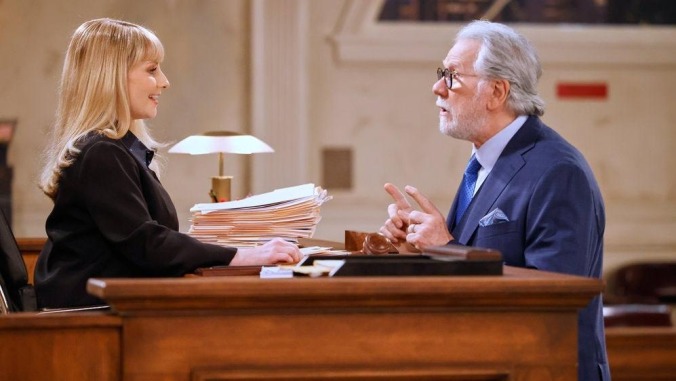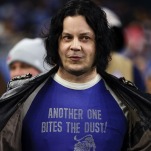Night Court review: The NBC revival (slowly) finds its rhythm
Thirty-one years after going off the air, Night Court is back, with original star John Larroquette and The Big Bang Theory's Melissa Rauch

Night Court—the new Night Court, that is, which is the sequel to the old Night Court—has a pretty big question on its hands, right from its opening moments. And it’s one headier than any of the legal issues that cross the bench of Judge Abby Stone (Melissa Rauch) as she presides over her courtroom full of nocturnal weirdos: Why? Why resurrect a TV show that went off the air 31 years ago, and which is mostly remembered at this point by die-hard sitcom nerds—and why do it in a way that sometimes feels needlessly beholden to those three-decade-old comedic rhythms?
The answers, as far as we can tell, are two-fold. The first is that Rauch—reigning sitcom royalty after years serving as one of the consistently funniest parts of The Big Bang Theory—seems pretty into the idea, throwing her considerable efforts into reviving this particular sitcom husk. And the second is, to put it bluntly: John Larroquette said “Yes.”
Nu Night Court doesn’t waste much time introducing us to either star, opening as it does with an ambitious (and largely ill-advised) scene that cuts between Abby and former Night Court prosecutor Dan Fielding on Judge Stone’s first day of court. (And, yes: She’s the daughter of that Judge Stone; although Larroquette is the only original Night Court regular to appear in the show’s first six episodes, the late, great Harry Anderson’s legacy is front and center for most of them.) Said scene is ill-advised mostly because it foregrounds one of the show’s big weaknesses: Its editing, which often seems bound and determined to suck the life out of every single one of the numerous jokes Night Court fires off every single minute it’s on the screen. That opening scene is meant to demonstrate Abby and Dan’s contrasting perspectives on the court; what it mostly does is instill an early sense of dread that takes a few episodes to wear off, as the show (mostly) finds its rhythm.
That especially includes the supporting cast, all of whom struggle in the show’s early going with a set of scripts that land somewhere in the territory between old-school broad comedy, and, well, more modern broad comedy. Either way, we’re talking big, obvious jokes, and it’s a mixed bag how each performer fares with the material. On the low end, we have Kapil Talwalker as court clerk Neil, who delivers many of his lines with a disaffected rush that serves sometimes weak material fewer favors. On the winning end, meanwhile, we’ve got India De Beaufort as the court’s new prosecutor, Olivia; De Beaufort attacks the character with a crisp intensity that’s exactly the kind of “playing to the fences” mentality that the show’s more throwback style demands.





![Rob Reiner's son booked for murder amid homicide investigation [Updated]](https://img.pastemagazine.com/wp-content/avuploads/2025/12/15131025/MixCollage-15-Dec-2025-01-10-PM-9121.jpg)

























![HBO teases new Euphoria, Larry David, and much more in 2026 sizzle reel [Updated]](https://img.pastemagazine.com/wp-content/avuploads/2025/12/12100344/MixCollage-12-Dec-2025-09-56-AM-9137.jpg)








